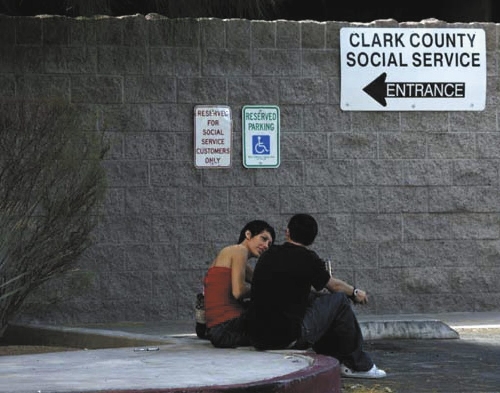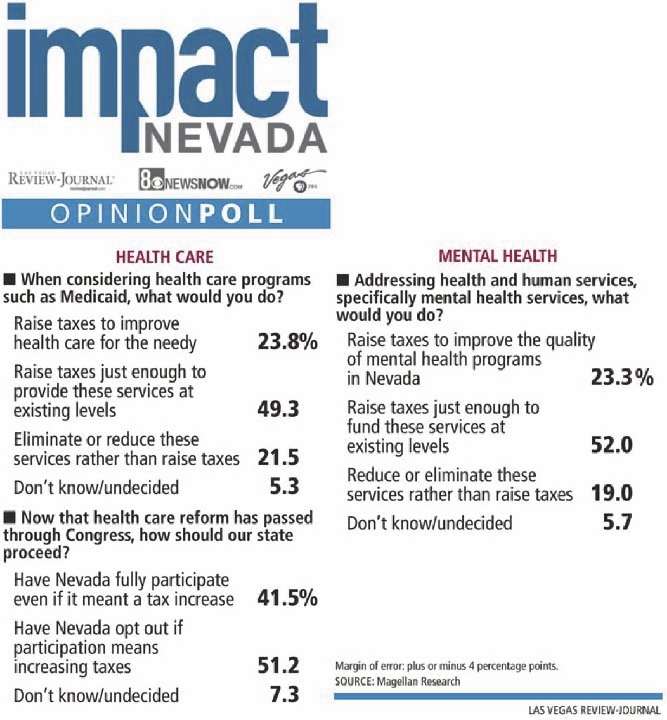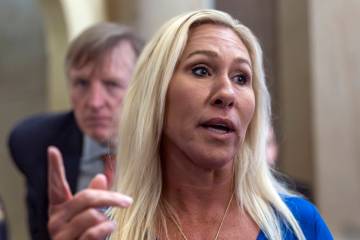Tax hikes backed for ‘safety net’
Nevada voters would rather pay more taxes to sustain "safety net" programs such as Medicaid and food stamps than see those services cut.
But Nevadans are less willing to increase taxes to improve those programs, according to a new poll.
"People seem to understand the importance of maintaining some kind of safety net but aren't being very altruistic with their tax dollars right now," said Marvin Longabaugh, a local attorney and president of Magellan Research, which conducted the phone survey of 600 likely voters in Nevada. "They're looking out for themselves."
The poll, commissioned by the Las Vegas Review-Journal, 8NewsNow and Vegas PBS, was conducted Sept. 6-16 and has a margin of error of plus or minus 4 percentage points.
Likely voters were asked whether they would rather raise taxes in Nevada if necessary to improve health and human services, raise taxes just enough to sustain programs at current levels or cut services instead of raising taxes.
About half of respondents said they would raise taxes just enough to sustain programs at current levels.
Voters were more willing to raise taxes to improve mental health care and Medicaid than they were to improve food stamps, welfare and children's programs. About a quarter said they would pay more to improve the former programs, while only about 18 percent said they would pay more to improve the latter.
"They understand we have to have some sort of government health program," Longabaugh said. "We can't just let people die."
The poll also asked voters to rank which programs they were most willing to cut rather than raise taxes and which programs they were most willing to pay more to improve or preserve. Respondents were most willing to reduce or eliminate health care reform passed by Congress and were most willing to accept a tax increase to improve or preserve health care programs such as Medicaid.
More than half of respondents also said they would prefer to opt out of health care reform if participation meant increasing taxes.
Democrats were more willing than Republicans to accept tax increases to improve safety net programs.
Overall, Nevadans seem to understand that the state "currently provides the bare minimum in human services we have to have in order to have a stable society," Assemblywoman Sheila Leslie, D-Reno, said. "We absolutely have to maintain the level of services we have now."
Leslie and others say safety net programs are under-funded in Nevada, especially substance abuse treatment and mental health services.
Recent studies have shown that Nevada has fewer public psychiatric beds per capita than nearly all other states. Nevada's spending on mental health agency services is seventh lowest in the nation.
The percentage of Nevada children diagnosed with mental health conditions who are actually getting treatment for those conditions is among the lowest in the country, according to statehealthfacts.org, a website run by the Henry J. Kaiser Family Foundation. Only six states have a lower percentage.
Leslie said any cuts to mental health services could create a "public health crisis," overwhelming hospital emergency rooms with the mentally ill.
"Nevada is definitely in danger of going backward," she said.
Overall funding for health and human services in Nevada has plummeted at the same time need has skyrocketed because of the recession, said Nancy McLane, director of social services in Clark County. Any service that is not considered absolutely "medically necessary" is in danger of being slashed further, including programs that help children, seniors and the disabled, she said.
"We are so bare bones right now," she said. "I feel bad for anyone who has to actually make the truly impossible choices" of what to cut.
Earlier this year, state legislators found themselves having to decide whether to cut funding for adult diapers, dentures and eyeglasses for the poor and disabled. The diaper allowance was cut, while the other services were maintained.
Many of the safety net services the state provides are mandated by federal or state law and must be funded to a certain level, said Ben Kieckhefer, spokesman for the state's Department of Health and Human Services.
The number of people on Medicaid in Nevada has risen to a record 270,178, according to the state. Medicaid is a federal program administered and partly funded by states, which means Nevada must foot some of the bill. It takes up about 15 percent of the state's general fund, the largest expenditure within Health and Human Services, Kieckhefer said.
Medicaid pays for 50 percent of nursing home beds nationwide and is the primary provider of health insurance for children in the child welfare system, he said.
The number of Nevadans receiving food stamps so far this year is 299,168 -- up from 209,999 in 2009 and 147,361 in 2008. Food stamp benefits are federally funded, but the state is required to pay half of the program's local administrative costs, which will cost Nevada about $15.8 million this year, Kieckhefer said.
Supplemental funding for such services in Nevada historically has been slim, particularly compared to other states, he said.
"Nevada has maintained these programs as last resorts for people who need help," he said. "It truly is a safety net. That's consistent with what Nevadans tend to think it should be."
Contact reporter Lynnette Curtis at lcurtis@review
journal.com or 702-383-0285.
News, poll results
COMING STORIES
Wednesday: Transportation
Thursday: Parks
Friday: Education
Saturday: Law enforcement
Sunday: Respondents’ final word






























